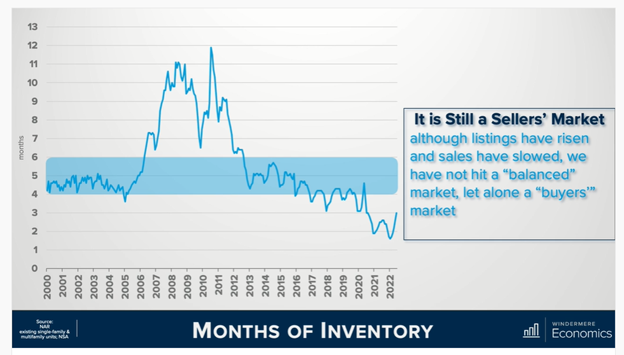Crazy Market Whiplash

We’ve come out of a market with historic price appreciation, 70-80+% of offers at/above asking price and a record sales pace to now a market with  sales slumping by 20% and sale prices 20-25% off our peak prices of April and May of this spring. Hold on to your head and your hat!
sales slumping by 20% and sale prices 20-25% off our peak prices of April and May of this spring. Hold on to your head and your hat!
We’ve seen interest rates climb from roughly 3% this spring to basically 7% right now. Yikes! Year over year prices are still up, but minimally now, over last year’s prices. Prices likely fall below last year’s prices in most of our area as we head further into the fall and winter market times.
Where will the whiplash go next? Affordability is declining with interest rate increases. Sales pace will likely continue to decline as rates rise. So will prices continue to drop as well? How much further and when will rates begin to improve? Lots of really big questions are on our minds right now. The answers aren’t simple.
First some perspective.
We really don’t want to compare our present market to the most unusual market activity in real estate history. This means we can’t really compare today’s or tomorrow’s market to 2021 or the first half of 2022. These were anomaly markets in price appreciation, pace and frenzy that were not and never should be considered normal. They weren’t. So you have to go back to 2018 or 2019 to gain some sense of perspective on inventory levels, sales paces and in most cases prices. Since 2020 had Covid interruptions, again, an anomaly year for most any comparisons.
Our inventory levels in King County are 500-1500 fewer homes today than 2019 and 2018 levels while our pending sales are 700 and 400 below 2019 and 2018 levels. So, yes, our sales are off; again mostly a factor of affordability. Our median price is $200K above those years; no small detail to overlook, and we’re $120K over 2020’s prices and $50K above 2021’s median price. We’ve had prolonged low interest rates—manipulated by government intervention, since those years, and our wage growth, population, household formations and job growth have increased demand and home prices. Today the government’s interference has the opposite intent. The Fed has been outspoken that they want to shut down or crush the housing market as they attempt to bring inflation under control. Every real estate sale has a profound positive impact on other industries, so to slow the entire economy, you target the biggest impacts first. Real Estate is that biggest target.
So what lies ahead?
I sure wish I knew the full answer but here’s a few points to keep in mind. We have a lot of tech employment in our area—right? Yes. Stock values on most of our large local employers are down about 31% in the past year; Apple only 21% but others more. That said, while hiring has slowed, layoffs aren’t slated to be large as these employers know the struggles to find new talent to help them grow or maintain prosperity in challenging financial times. It’s cheaper to keep the talent, regardless of cost, than to find and recruit replacements. That’s very stabilizing for our region.
We also know that household formations are continuing to grow (appx 1.7M in 2022) as millennials age up and get better jobs—see comment above on need to find replacement employees. Small studio and 1 bdrm apartments are out there but larger apartments and rental houses are harder to find and prices for those are rising; in much of our area by 20+% in the last year. So, if rents are rising, inflation is rising and you need a place to live, do you buy and get some stability to your cost of living or continue to rent and wait for prices and interest rates to drop? It’s not likely prices and interest rates will be dropping at the same time. Any relief in interest rates or home prices likely increases demand.
Lots of conversations and fear about recession.
Are we in one, is it coming, when, for how long, ho w severe?
w severe?
We’ve already changed the definition of a recession—2 consecutive quarters of declining GDP. It’s hard to say we’re in a recession when unemployment is so low, spending is still strong and inflation is still so high. The new perspective is we’ve dropped off the skyrocketing inflation pace but not really hit a recession yet. The sad point is, there’s no new agreed upon data to say what is a recession. So again, some perspective is needed.
With the overall low unemployment levels and the strong wage levels presently in place, most forecasts I’m seeing say these factors will moderate the depth and likely duration of any economic downturn. While the Fed said they’d like to see unemployment rise by another 1.5-2%, so something into the 5%+ range, employers are resistant to cut staff, again as it’s been very hard to staff up since the Covid outbreak. Employers think they can maintain profitability, even with higher labor costs. This is good news for business but gives the Fed more reason to keep interest rates high to help fight inflation. So who wins this struggle? The Fed has indicated it will be making another .75-1.25% rise in their rates by the end of this year. That won’t translate completely to mortgage rates but it’s not good news for housing. There is some indication the Fed may actually stop at the .75% increase level and then sit still to see how the economy reacts and performs for a few months, before taking any further action.
What does all of this mean for house prices and affordability?
I mentioned at the outset, there isn’t a short answer or clear path. As long as this article is, that point hasn’t changed, yet. Good jobs are always good for the housing market. Household formations are good for housing. High interest rates are not. We’re starting to see more effective Adjustable Rate Mortgages come back into the market. Agents and Sellers are also recognizing the value of interest rate buy downs, to buy down the interest rate on your new home to a 5% or so range is more helpful to buyers than a $40-80K price reduction. The hope being, if we can make monthly payments more affordable by ARMs or buy downs, more people can afford to buy that next home while prices are having a near term decline. That said, while inventory levels are at similar levels to our peak markets and below our pre-2019 levels, we are still short on inventory. We need more homes to sell. That’s good and bad for the housing market. Low inventory means stable or upward pressure on home prices but that leads to higher prices and less affordability.
Let’s talk a bit more about inventory:
Builders have never gotten back up to their normal building levels seen prior to the 2008 Recession. They’ve been well off the pace of building for 15+ years now. That means we’re not going to be building our way out of an inventory shortage. We also had record high refinance levels from 2020 until early this year. Homeowners locked in mortgage rates from 2.75-3.5% levels for 15-30 year terms. Many of them won’t be selling soon in the face of 7% interest rates today. So, if you’re thinking inventory levels will continue to climb, you may need to reconsider that scena rio. With strong employment levels and near record high equity levels most homeowners have in their homes, desperate sellers won’t be that common. If we do see any sense of an economic downturn, and I expect we will, it should help reduce interest rates but likely only to the 6% range. This still improves payments and affordability by 10%. That’s a good thing for housing but likely puts more demand on inventory.
rio. With strong employment levels and near record high equity levels most homeowners have in their homes, desperate sellers won’t be that common. If we do see any sense of an economic downturn, and I expect we will, it should help reduce interest rates but likely only to the 6% range. This still improves payments and affordability by 10%. That’s a good thing for housing but likely puts more demand on inventory.
So who would buy or sell a home now?
Great question. Real estate is based on change and change is a constant in all of our lives. It operates at different points, levels and speeds but it’s always happening. When do you change your home? For most, only when there is a real need or desire. Given our current market mentality, it may take a bigger change to have you move. The expectations are that the stock market levels will get back to their recent top levels by 2024-2025. Housing may be in that same timeframe as well. So, if you’re going through change and you would live in your new home for the next 5-7 years (the new norm is now 10-11 years of time for staying in our homes) and you can find and afford that home you want now, why wouldn’t you make that change now. It’s likely you’ll be able to lower your future payments soon, by refinancing, and you can secure that home now, at a lower price than earlier this year, with much less likelihood of bidding wars. This may not be the bottom on home prices but you’ll be in this new home plenty long enough to see the price rising, likely above this years’ peak, as our region’s economy rebounds because of our strong economic resources.
Why would you sell now? Again, change. It’s likely interest rates do rise over the next few months and affordability declines. Where are you going? When would you like to be there? Today’s market likely offers you a great return on your investment and provides the funds and freedom you need to go where you’d like to be. The bridge between where you are and where you want to be may be closer now than recent times. Will the Spring market be better? This is a matter of analyzing specific circumstances about your home, your hyper-local market conditions and your situational needs. The overall reality is, if you have the need, the market is still quite strong and selling your home at a very good value is still a reality we can achieve. It may not be our peak but it’s almost certainly higher than most any time in our region.
One last point on who should buy a home now.
Remember when I mentioned Builders are building way fewer homes since 2007? The most troubling part of th0se statistics are the vast majority of recent permits have been for multi-family homes—often apartments, most commonly 1-bedroom apartments—some for condominiums and townhouses and fewer for detached single family homes. While these alternative home choices help with affordability, what they are also doing is dwindling our single-family home supply. This shrinking supply or addition to inventory is driving up prices and taking away the opportunity for the number one wealth generating asset in our country—owning your own home. The data shows homeowners have 400% greater net worth than non-homeowners. Our homes are often our number one asset as it’s harder to save money in the face of rising rents. Locking in our cost of housing, even at higher interest rates, helps promote your long-term net worth. From this perspective we should all be buying a home or investment property to help improve our future net worth. This is becoming harder to do with shrinking inventories, while also more essential.
Our present economic conditions are unique. The “right” answer on what you should do is also unique. My goal has always been to offer you a place of calm, of perspective and of information so you can make a more informed decision. One thing I know is certain, our region will remain strong, housing demand will continue and in the not-too-distant future, we’ll see home values rising and interest rates declining. Where these conditions overlap with your needs is something I’m happy to discuss and offer you guidance on. Let me know when you need my assistance. I’m happy to help.
Thank you for your time.
Top photo courtesy of Hans-peter-gauster/Unsplash
Chaos photo courtesy of Brett Jordan/Unsplash
Market Update Amid Uncertain Times

Pardon my absence, the market has been running extremely hot for the past several months and I thought I’d offer some insights on the activity levels and sentiments. Contrary to many predictions early in the year, the market took a 4-6 week breath in mid-March but has taken off in a full stroke sprint since then. Almost all price ranges, property types and locations have had amazingly strong activity. Prices have been on a steady climb, up 4-8% since March, more in some pockets of the market and multiple offers have been more common than not. We’ve seen 40+% of the homes selling above asking prices; most in 6 days or less time and prices averaging 4% over asking prices in the broader market.
Interesting side note, initial pricing is still keenly critical. If a home should be priced at $675K, it needs to be priced there. Even if it may get bid up to $720 or more, pricing at $685-690 likely means the seller ultimately sells for less, in longer time and with more concessions. This does vary a bit by specific location but overall, the market is still amazingly price sensitive, even in our so-called Seller’s market with rising prices. This price sensitivity is even more critical in condominiums which are lagging the market pace but still strong overall. Downtown Seattle condos have some unique headwinds for sure.
A second point worth noting is that our weekly sales volumes have been 12-50% higher per week than 2019 levels since the end of May. Combine this with the fact that our inventory of available homes for sale is down 40-55%, it shows we have a true, organic and sustainable demand for homes to buy. We have lots of people looking for a home to buy and not enough supply to fill the demand.
So where is all this demand coming from? Mostly from local buyers, secure in their jobs and incomes and motivated by record low interest rates. The decline in interest rates is counter-balancing the rise in prices so people can pay a higher price and still lower their monthly payments. Affordability is rising.
Many first-time buyers are trying to jump into the market. Other current homeowners are making lifestyle adjustments to their home desires and moving up, down, in or out of cities and suburbs. The reasons are varied but the result is the same; they’re looking for a change, now.
Record low interest rates are projected to be with us into 2023 or beyond but if 2020 has taught us anything, it is that tomorrow’s paths aren’t certain. Buyers of all ages and demographics and for a variety of reasons are seeking to secure a home for tomorrow, today, by buying a home now.
I expect this desire for certainty and to capture a lower cost of housing will continue for the balance of this year and into 2021. We have a lot of life uncertainties going on, so being secure in your home is a foundational piece of personal security and comfort that likely continues to drive our local market. Business expansion and movement around the Sound is and will continue to bring more people and more demand into our region. With all of the headlines of uncertainty, this demand seems to be one good fortune we can continue to count on.
Photo courtesy of Paule Knete-Unsplash
Interest rates & you….
Economists and financial forecasters have been telling us to expect interest rates to rise for the past 5 years or more, yet rates resisted. Now they have dropped back down to a 3.625% range for 30 year fixed rate mortgages; even for jumbo loan amounts–loans above a $417,000 amount, that typically aren't bought or secured by government entities like Fannie Mae and Freddie Mac. The rates get even lower for 15 year mortgages, now closer to a 3% rate.
This can be a great opportunity for those wanting to buy a home. Most of 2015 saw rates bouncing between 3.75 and 4.125%. The payment differential between our current rates and what you may have could be a $60-85+/month in savings. This also means that those of you who bought a home a few years ago and possibly were required to pay for mortgage insurance can now consider refinancing your loan and remove this mortgage insurance premium while possibly lowering your interest rate too. Two ways to help lower house payment. Since much of our area has seen 9-15% appreciation, just in 2015, and similar rises in 2014 values, many of us have greater home equity than we anticipated. A 20% equity is required to remove mortgage insurance in most cases. If you still like your home there is no reason to sell it but you may want to consider refinancing it to remove this insurance premium or lower your payment or switch to a shorter term mortgage to help pay off your home sooner. .
One other consideration while rates are low may be to refinance your home and pull out some equity in your home to pay off other debts. I'm not a big fan of using our homes as a piggy bank but interest rates on credit cards, cars and other large purchases have been rising and those interest payments aren't tax deductible. Your home's interest rate is deductible, in most cases, and often at substantially lower rates than our other debts carry. As always, a conversation about your long term goals, needs and circumstances is wise to see what the best steps for you may be, but our homes are now back to, at or above their peak values and this can help you solve some financial planning issues.
If you are thinking you'd sell your home in the near future, refinancing may not make sense; but it is possible to do a no-cost refinance and while you won't get the lowest rates of today, you'd likely be at a 4-4.25% rate. That is still a very attractive figure and can help you reach other financial goals while not adding to your loan balance.
There is lots of talk about interest rates rising this year and I'd say it's stil likely they do, but for now, the rest of the world's major economies are struggling more so than the U.S. and this has meant large institutional lenders around the wrold are buying U.S. mortgage backed securities as a safe haven for their monies until the world's ecoomies reach calmer levels. I'm not expecting this to happen too soon, so it's likely rates stay in a narow range around 4% most of this year, with some dips, like we're seeing right now, presenting themselves to all of us as savings opportunities. Let me know if you'd like a recommendation for a good lender or to talk more about your specific circumstances. I'd be happy to help.
What do rising interest rates really mean?
Almost all of this year the "fear" reportings have been warning us of interest rates rising as though this is such a horrible event. The Fed was supposedly going to do this in March, then certainly by June; I'd thought they'd do it in September, as did much/most of the financial markets. When they didn't raise them in September, we saw the worst stock market performance of this year; the Fed didn't do what most everyone expected they would. It looked like they may put this off until January, so the stock market rebounded. Now the Fed has raised rates and stock market rallied, minorly but positively, as the Fed did what it seemed they had to; raise rates. The overall economy has improved and if you don't raise rates now, when would you? If the overall economy declines in the coming year, they then have some room to move back down or ease on rates to try to spur on new investments.
So what happens now? Will rates continue a steady climb up? Will all interest rates rise? How does this affect me?
It's possible interest rates could rise but most rates already rose this year, for almost all of 2015 and yet it's turned out to be one of the strongest years for home sales and appreciation locally and nationally in 9 years and one of the strongest overall for sales as a whole. So, rising interest rates aren't a killer of the real estate market or home values.
In reality, real estate rates are set by the Fed at all but based on Bonds and Mortgage Backed Securities. While these don't operate in a vacuum, they aren't directly related, correlated or affected by the Fed. Often mortgage rates will move opposite of the Fed. The bonds and securities affecting mortgages are like all other investments, a factor of supply, demand and alternatives. It's possible interest rates will rise further in 2016 but not by any dramatic amount. In our local market, rates are hovering in the 4.125-4.25% rate. This might raise another .125-.25% in 2016 but what this means is your monthly mortgage payment might rise by $30-$60 per month, depending on the size of your mortgage and what rates you're comparing. While any rise is unwanted, it's not likely that $30-$60/month will change your ability to qualify or interest to buy or sell your home, if your true desire is to buy or move. Don't let the "fear reporters" run your life or your expectations. The market will continue to be strong in 2016 due to organic growth of population, strong employment and the returning buyers who've been sitting on the sidelines waiting for the credit, savings and employment to improve since the economic downturn of 2007-2011.
It is not likely that the Fed will raise their rates much, if any further, in 2016 as the bulk of the world's economies aren't doing as well as the U.S. and as we raise the Fed rate, the U.S. Dollar increases in value and we make our goods more expensive to the rest of world, hurting our companies and putting downward pressure back on stock values, the Dollar and our interest rates. These variables are all operating on tiny margins of stability, so only tiny shifts can be made without upsetting the balance of many, seemingly unrelated aspects to our economy.
The main point to recognize is that while I can no longer get you a 30 year fixed mortgage at 3.5-3.75%, I can still help you find a historically great rate, affordable to your needs and if you want the lower rates of 2014, we can find those in 7 year fixed mortgages, which might be as long as you may be in your next home anyway. If you plan to stay longer, then recognize the true nature of a low 4% interest rate and you'll see you're benefiting by the stronger economy, even if your monthly mortgage rises a little more than you hoped for.
Market pace continues to rise
Most of the local real estae market continues to thrive with price recovery in almost all areas strengthening to near or even above our economic recession data. February saw an increase in listings but that was matched with an increase in sales. While the statistics say we have higher inventory than last February, that's not matched with real life experience in the field, as any active buyer in the urban marketplace can attest. Prices are rising as multiple offers are once again the norm.
If 2015 follows the activity pattern of 2013 and 2014, which is my prediction, we will see the market calm in the summer months as buyer fatigue sets in and vacation times begin. Today's stock market decline was led by fears of the Fed raising interest rates as our national economy continues to rebound. This could lead to more upward pressure on home loan rates, already up about 3/8% so far this year, and that will likely lead to increased buyer/buying pressure by people trying to lock in what may be the last of our long-term rates in the 3% range. Recognize that a long term rate in the 4's is hardly a bad thing but, as always, people want to save money when and where they can, so jumping now is likely a stronger impulse for many buyers.
My caution would be that to buy something that doesn't really work for you as a home so you can save money on your loan is not the right step as selling this new home in a few years and buying what you really wanted or will need/want at that time and then having a likely higher interest rate will cost you more than exercising caution today and finding the right home at a still very remarkable rate and payment.
Lastly, for those of you who think buying or selling without an agent will save you money, please recognize that it's very difficult to maximize the price for your home without full marekt exposure and even more difficult to win the home you're trying to buy in a multiple offer situation without the guidance of a knowledgeable agent to help you. You are most likely to make more money, save more money and lots of frustration with the assistance of a good agent on your team.
Should You Refinance?
There are many news headlines and stories about home owners "needing" to refinance their home loans. While we are at near record low levels for interest rates, before you refinance you should ask a few questions of yourself and loan officer.
First, how low is your current interest rate? If it's not at least 1/2% higher than your new rate, it's not likely as wise.
Second, how long will you continue to own your current home? The longer you will continue to own the home, the more likely this can be beneficial. Next consider what the projected savings would be relative to the cost of the refinance. With these very low rates, you may want to consider selecting a slightlyhigher interest rate available for little to no cost for the refinance vs. the lowest possible interest rate. The shorter the time you might own the home going forward, the more important this consideration might be. Opting for 3.875% interest rate for no cost to you vs. a 3.5% interest rate that costs you 2-3% of your loan balance in costs, may make more sense.
How long you've had your current loan and what the term of your new loan is will be another consideration. Whether you will be removing mortgage insurance or needing cash back from your home are also questions and considerations to make. There are many factors to evaluate and balance before you rush out and join the herd to refinance. If you'd like a recommendation for a good loan officer or to discuss your specific situation, let me know. I'd be happy to help.
 Facebook
Facebook
 X
X
 Pinterest
Pinterest
 Copy Link
Copy Link


